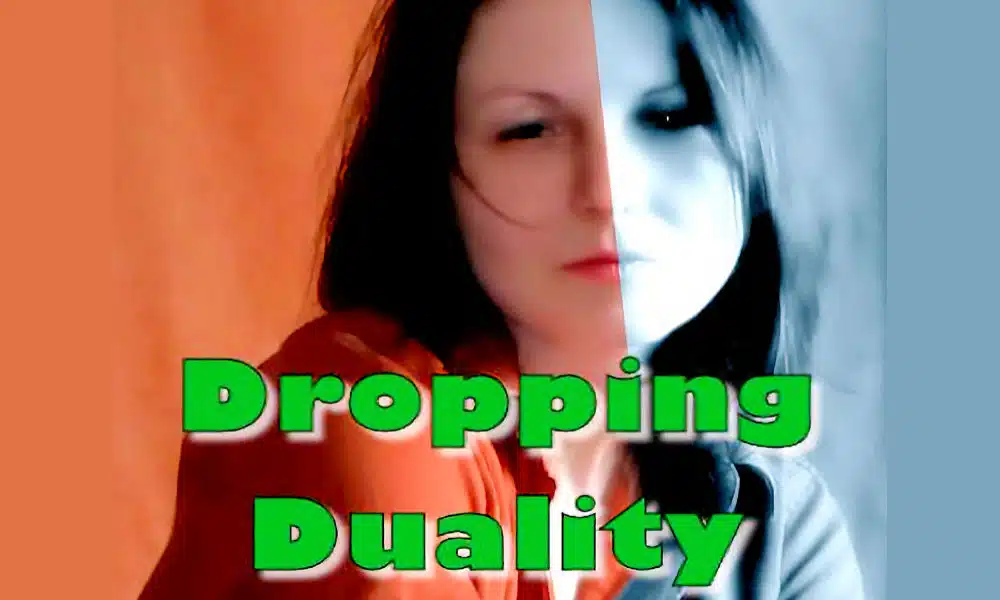Dropping Duality — On “Success” and “Failure” — illusions, both. The stories we tall ourselves keep us stuck. Until we notice exceptions, which point us in the direction we want to go.

Want to learn more about living a full and meaningful life?
Want to have the best relationship ever?
Check out my books
On Dropping Duality — “Success” and “Failure”
It ought to be apparent that things like success and failure, what we can or can’t do, etc. are not “fixed entities,” but rather beliefs that have no substantiality. We do well to let go of such thinking.
Here’s a question raised by a reader, concerning limitations. I love questions, so feel free to e‑mail me any time!
“I’d be interested in what you might have to say about personal limitations and failure. How do we acknowledge and accept them in a positive manner? How do we act within our limits, yet reach beyond our grasp? There seems an inherent contradiction between “setting your mind on anything” and the real, universe-given limitations that we are born with. What does failure mean with respect to all of that?”
One of my books is called, Living Life in Growing Orbits, and the way it works is that there are weekly concepts, and then daily exercises. You follow along, get a sense of the topic for the week, and then do what’s suggested, every day — for a year.
It starts out with Rock beliefs. (click to read a sample) These are the “ancient” beliefs we all have, but are often unaware of.
We nevertheless operate out of those beliefs, and often on auto-pilot. This is why we keep getting into messes that seem different on the surface… but with a little examination, we see “Same old, same old.”
The second week, I introduce:
Water Situations (click to read a sample)
Water Situations are things in our life that fly in the face of what we believe to be true — our Rock (or fixed) Beliefs. We do something, and get results we weren’t expecting.
Normally, we write off the exception, to our detriment.
A simple example: prior to learning to ride a bike, we had a Rock belief that we either “can’t” or “don’t know how.” Most of us, when trying to learn, spent many minutes or hours falling over and skinning our knees.
Then, one odd and miraculous day, we stayed upright, and drove around the block, and had a Water experience. “I can ride a bike!” (Until you realize no one taught you to stop, and the only way to do so is to fall over… my dad yelling “Hit the brakes!” not exactly cutting it…)
So, then what happens?
The Rock belief (can’t ride a bike) gets overridden by the Water experience (can ride a bike.) The Water experience becomes the new Rock belief (most of us who have learned to ride a bike also assume we still can, even after years of not.)
When we were growing up, everything was hard, until it wasn’t. Bike riding, running, school, dating. Lots and lots of stuff. We just tucked our heads and got on with it
Then, we grew up — and in a sense learned about dropping duality
We forget this “hardwired-in” pattern of learning: can’t, practice, can. Our Rock beliefs are lodged in our heads (Rock head?) and dynamite can’t dislodge them. We become quite smug in our denial of our ability to change.
Let’s remember: when we were growing up, failure was called practice.
We didn’t define ourselves by what we couldn’t do. Without much thought, we just figured things out. We didn’t limit ourselves unnecessarily.
I used to toss in the caveat that we’re not talking physical limitations here. Sure, wanting to be able to “leap tall buildings in a single bound” doesn’t mean we can. I’d point to my height and declare that I could never be a basketball player.
But then I saw a video of some kid who is under 5 feet tall and plays basketball extraordinarily well. I didn’t believe short people could play… and now I do… little people can play basketball!
In a contest between rock and water, water always wins

We want to understand that we are limited by our beliefs, not by outside forces. Then, we understand that the solution to the limitation is, first, a change of belief, AND then a change in behavior.
I know. It’s not easy to admit that we choose each and every one of our behaviours, as well as how we limit ourselves.
We choose what we think we can do, and emphatically we choose what we will not do. The only way past this, (and why the first two weeks of Living Life in Growing Orbits is all about listing beliefs) is to explore our beliefs with a critical eye.
As we unearth and “verbalize” what we’ve been told by others, and as we “verbalize” what we’ve done with those rules, we get the opportunity to decide what is helpful, as opposed to what was helpful for someone else.
As we listen to ourselves, we hear our own Rock Beliefs.
- “No one will ever love me.”
- “All they want me for is sex.”
- “I’ll never figure out what I’m passionate about.”
- “I can’t let go… lose control.”
- “I’m not (smart enough, rich enough, connected enough) to do what I want.”
Out they tumble.
Rock, limiting beliefs are easy to find — they are always expressed through some version of, “There’s nothing I can do about that. It’s just how I am, (or it is.)” or, “It’s my parent’s fault. They made me the way I am.”
It’s as if we believe we are compelled — forced — made to — behave in a certain way, and no other.
I once worked an artist who told me that he was “a procrastinator.” No choice. He couldn’t get to what he’d agreed to do for me, as he’d procrastinated about a couple of other things, which were stacked up ahead of mine.
I was just supposed to wait.
Instead, I offered money and a deadline — and connected the two. I guess no one had done that with him before. He got his work to me one day late. Not bad.
Every intervening e‑mail, though, reiterated how far behind he was, and how he hadn’t remembered committing to a deadline. And yet, he got the job done.
So, it begs the question: who makes him procrastinate, and will he choose to get past it?
Water stories remind us that nothing is graven in stone.
As we look at these “contrary” stories, we can make the leap that anything that gets in our way originates in our own perception.
Rather than proclaiming stuck-ness, we can change our approach to the situation, and also change the rule(s) that got us messed up in the first place.
Just like the procrastinator who now has one Water story of being on time.
So, what does this have to do with the question I received?
The question is all about how one chooses to define the situations confronted. Here’s an example:
I once counselled a 17-year-old who had been abused. After the event, she thought, “Because of that, I’ll never be able to trust anyone again.”
For the five years after her experience, her Rock belief was set in the cement of “never.” She missed tons of exceptions, always noticed things that supported her belief.
I helped her to change her definition of the abuse to “a situation I experienced, and worked my way through.” She learned to drop blaming the abuse for everything that didn’t work out in her life.
And she learned to trust again by… wait for it… trusting.
We’ve all been trained from birth to label the events of life as either “success” or “failure.” I’m not so sure that life is quite that clear cut. Learning this is what I mean by dropping duality
I think that my relationship with Darbella is pretty much the most elegant relationship I see around me. I say because I’ve been hanging out with Dar since 1982.
On the other hand, my marriage to Dar is my third.
Now, here’s the question — were my first to marriages failures? Of course not. Unless I choose to view them that way.
Prior to age 32 (when my second marriage ended,) I was dumber than a stump when it came to relationships. My motivations for being in relationship were cloudy. I also thought it was my god-given right to insist on everything going my way.
Then, I “got it.”
Out of my experience with the end of my second marriage came “The List of 50,” which is now a full length book called Find Your Perfect Partner.
I learned that I had begun past relationships on the basis of how the person looked in a tube top. I’d meet someone, and think, “Well, she’s not whom I want, but I can change her.”
I realized that if I put energy into thinking about what I really wanted in a partner or a friend, I’d have a much better chance of finding them.
This was the lesson of my second marriage.
Perhaps, then, the only “failure” is when I do not learn from an experience, and therefore end up repeating it. That being said, I also am the sum total of all of my experiences.
The real question is, am I stuck, or am I changing what isn’t working?
A second part of the writer’s question concerns limitations.
I’d like to suggest the idea of “expanding possibilities.” I am suggesting that, far from there being limited choices for your life, there are endless other ways of being.
The limitations we confront are “self-made” constructions, bolstered by the stories we tell ourselves. Or, as the expression goes, “Argue for your limitations and they are yours.”
We have the potential, in dialogue, to examine and re-examine the stories of our life. We can listen to what we tell ourselves, how we describe our situation, and we can begin to understand that, far from seeing our lives objectively, we see them through our beliefs / stories.
If we do not choose to confront our beliefs, we will find ourselves living self-fulfilling prophecies that are limiting and limited in the extreme.
I believe that all limitations are self-imposed.
Sure, some things are beyond my control — that would be all the stuff outside of me. We walk in tension between the things we can control (our thoughts, beliefs, behaviours,) and what we can’t (what happened in the past, the behaviour and beliefs of others, “circumstances.”)
The wise person is he or she that can narrow their focus while broadening their horizon, seeing, for themselves, both what is possible and what is worth the effort.
It is so, especially in the West, that we can have pretty much whatever we want. We’ve taken that to mean acquisition of things as a measure of worth.
The “system” supports such thinking.
Or, you can choose to determine your “success” based on personal satisfaction with a job well done.
So, let’s say I want to be a “best selling author.” Hmm. There’s a difficulty in thinking that way.
I can control the “author” part. The “best selling” is determined by the public. I would be better off setting my sights on being an “above average,” then “excellent” writer.
Having achieved the best I can achieve, given my skill set, I will either be, or not be, “best selling.”
Take van Gogh. If memory serves, he sold 2 or 3 paintings in his life. Question. Did he “succeed” or “fail” as an artist? Hmm.
The question is one of realistic expectations, coupled with success measured not on comparisons with others, but on comparisons with myself.
